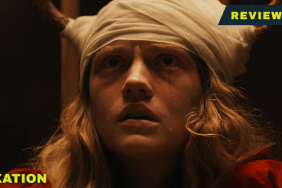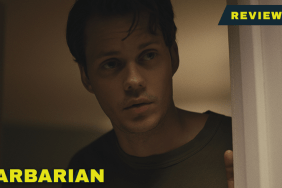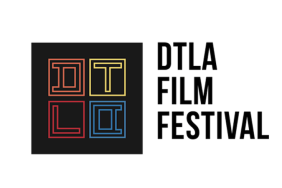
Chilling socio-political horror film HARD LABOR gets the SHOCK review.
The most definitive moment of horror in Marco Dutras and Juliana Rojas HARD LABOR is its final shot. In it, an unemployed man at a motivational jobs market seminar rips off his tie and pushes out one of the most primal cinematic screams in recent memory. The man, Otavio (Marat Descartes), isnt alone in his despair: hes instructed, in fact, to join his fellow attendees in unleashing their inner animal as they navigate an increasingly downsized Brazilian economy. For Otavio and the rest of these would-be bread-winners, the only thing worse than the emasculation of joblessness is the notion that theyd pay someone else to relieve themselves of it.
HARD LABOR isnt an exploitation film but a film about exploitation, and in its quiet way, it earns the cry of despair its ending oppressively piles on. And yet, the events that precede HARD LABORs climax are another matter altogether disturbing in their subtlety, disjointed as parts of the writer-director duos attempted whole.
Helena (Helena Albergaria), Otavios stoic housewife, purchases a grocery store whose earnings will provide their familys new primary source of income. Soon after its grand opening, the stores modest charm turns sour as it begins to show signs of containing some sinister secrets: a dog snarls at the storefront as Helena closes it for the night; black sludge seeps up through the cracks of the floor; large teeth turn up without rational explanation. Moments of creeping doom, indeed, and the meticulousness of their placement throughout HARD LABOR naturally begs the question: where does it all lead? (That Dutras and Rojas glimpse into Helena and Otavios domestic life, as well as the couples relationship to their newly hired live-in maid and babysitter, Paula (Naloana Lima), shifts the films ominous tone toward naturalistic familial drama keeps any answers tantalizingly vague).
Ambiguity, here, is the name of the game, and HARD LABOR has it in spades. This is thanks in no small part to Dutras and Rojas expertly honed kitchen-sink approach, which serves strongly their study of shifting power dynamics within the blood and business families of both Helenas house and her store. Albergaria, Descartes, and Lima are uniformly excellent at embodying the symptoms of economic disparity that lead each of their characters, in their various forms of (un)employment, to either exploit others or become exploited themselves. As all of this social realism establishes whats at stake (for Helena, its her familys stability; for Otavio, his social identity; for Paula, her citizenship), an eerie discovery of gargantuan (werewolf?) skeletal remains feels as though its ready at any moment to provide some revelation that will, at long last, put the films collision of psychological horror and indie drama into perspective. Mystery begets surprise and climactic clarity or so it seems.

But this is where HARD LABOR gets caught up in chasing its own proverbial tail. The sometimes supernatural, other times earthly-yet-uncanny manifestations within the four walls of Helenas store, we are made to believe, are anything but metaphorical: their existence is provable with the hard evidence bones, ooze that she and her husband observe and eventually collect themselves. And yet, these very manifestations are left so unexplained, so without even a hint of implication about their origin, that the menace of their presence evaporates. For a film that for so long plays out like a modernist twist on Kubricks symbolist vision of haunted spaces, HARD LABOR emerges as a love letter to THE SHINING that was given a second thought, scribbled out, and thrown away. While this isnt necessarily a bad thing, the film is a litmus test of sorts, one that will measure how much stock audiences may or may not take in clues that are deployed throughout a narrative.
If you are willing to accept characters, events, and genre tropes (in this case, something faintly reminiscent of werewolf lore) as purely representative rather than real that is, that you look at them as standing for something rather than being something then you may come away from HARD LABOR with the impression that its one of the strongest foreign indie horror films of recent years. If you crave the feeling of being convinced of the real threat of on-screen horror, then you may come away from HARD LABOR with the impression that it is not a horror film at all. Regardless of what category you may fall under, one thing in the film is clear: the gap wolf and man is closing. And even if HARD LABOR is more vexing than it is rewarding, that notion may be scary enough.










